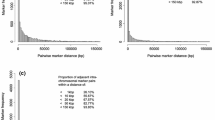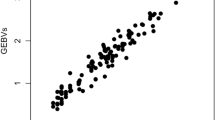Abstract
Key message
A reciprocal testcross design increases the relatedness among single crosses and testcrosses, thereby increasing the effectiveness of genome-wide prediction in maize.
Abstract
A reciprocal testcross design uses parental inbreds in an opposite heterotic group as testers in maize (Zea mays L.) inbred development. In particular, doubled haploids from the A × B cross are testcrossed with inbreds Y and Z, and doubled haploids from Y × Z are testcrossed with inbreds A and B. Our objective was to determine if a reciprocal testcross design is superior to a traditional, non-reciprocal testcross design. A total of 700 Iowa Stiff Stalk Synthetic (BSSS) doubled haploids and 231 non-BSSS doubled haploids were developed from 10 breeding populations and had data on 11,032 single nucleotide polymorphism markers. Each doubled haploid was testcrossed to one to five testers from the opposite heterotic group, and the resulting 1642 testcrosses were evaluated in multilocation yield trials in 2019. Divergent selection for yield/moisture, on the basis of genome-wide predictions according to a reciprocal testcross design, led to significant responses (in 2020) in all 10 populations for yield/moisture and moisture and in three populations for yield. Predictive ability for yield/moisture and moisture was 0.11 to 0.26 higher with a reciprocal testcross design than with a testcross design. This higher predictive ability was attributed to a stronger relatedness between the training and test populations. No significant difference in predictive ability was found for yield, for which predictive ability was lower. Differences among genetic models that included and excluded specific combining ability were small. Overall, the empirical results supported the usefulness of a reciprocal testcross design in maize breeding.

Similar content being viewed by others
References
Albrecht T, Wimmer V, Auinger HJ, Erbe M, Knaak C, Ouzunova M, Simianer H, Schon CC (2011) Genome-based prediction of testcross values in maize. Theor Appl Genet 123:339–350
Albrecht T, Auinger HJ, Wimmer V, Ogutu JO, Knaak C, Ouzunova M, Piepho HP, Schon CC (2014) Genome-based prediction of maize hybrid performance across genetic groups, testers, locations, and years. Theor Appl Genet 127:1375–1386
Bernardo R (1994) Prediction of maize single-cross performance using RFLPs and information from related hybrids. Crop Sci 30:20–25
Bernardo R (1995) Genetic models for predicting maize single-cross performance in unbalanced yield trial data. Crop Sci 35:141–147
Bernardo R (1996) Best linear unbiased prediction of maize single-cross performance. Crop Sci 36:50–56
Bernardo R (2020) Breeding for quantitative traits in plants, 3rd edn. Stemma Press, Woodbury
Bradbury PJ, Zhang Z, Kroon DE, Casstevens TM, Ramdoss Y, Buckler ES (2007) TASSEL: software for association mapping of complex traits in diverse samples. Bioinformatics 23:2633–2635
Brandariz SP, Bernardo R (2019) Small ad hoc versus large general training populations for genomewide selection in maize biparental crosses. Theor Appl Genet 132:347–353
Chi RK, Eberhart SA, Penny LH (1969) Covariances among relatives in a maize variety (Zea mays L.). Genetics 63:511–520
Daetwyler HD, Villanueva B, Woolliams JA (2008) Accuracy of predicting the genetic risk of disease using a genomewide approach. PLoS ONE 3:e3395. https://doi.org/10.1371/journal.pone.0003395
Dandine-Roulland C, Perdry H (2018) Genome-wide data manipulation, association analysis and heritability estimates in R with Gaston 1.5. p 6. In: Bermejo JL, et al. (eds) 46th European Mathematical Genetics Meeting, Cagliari, Italy
Eta-Ndu JT, Openshaw SJ (1992) Selection criteria for grain yield and moisture in maize yield trials. Crop Sci 32:332–335
Giraud H (2016) Genetic analysis of hybrid value for silage maize in multiparental designs: QTL detection and genomic selection. PhD thesis, Université Paris-Saclay, France
González-Diéguez D, Legarra A, Charcosset A, Moreau L, Lehermeier C, Teyssèdre S, Vitezica ZG (2021) Genomic prediction of hybrid crops allows disentangling dominance and epistasis. Genetics. https://doi.org/10.1093/genetics/iyab026
Habier D, Fernando RL, Dekkers JCM (2007) The impact of genetic relationship information on genome-assisted breeding values. Genetics 177:2389–2397
Habier D, Tetens J, Seefried FR, Lichtner P, Thaller G (2010) The impact of genetic relationship information on genomic breeding values in German Holstein cattle. Genet Sel Evol 42:5. https://doi.org/10.1186/1297-9686-42-5
Hallauer AR (1990) Methods used in developing maize inbreds. Maydica 35:1–16
Hallauer AR, Fo MJB (1981) Quantitative genetics in maize breeding. Iowa State Univ Press, Ames
Jacobson A, Lian L, Zhong S, Bernardo R (2014) General combining ability model for genomewide selection in a biparental cross. Crop Sci 54:895–905
Kadam DC, Potts SM, Bohn MO, Lipka AE, Lorenz AJ (2016) Genomic prediction of single crosses in the early stages of a maize hybrid breeding pipeline. G3 Bethesda 6:3443–3453
Krchov L-M, Gordillo GA, Bernardo R (2015) Multienvironment validation of the effectiveness of phenotypic and genomewide selection within biparental maize populations. Crop Sci 55:1068–1075
Lian L, Jacobson A, Zhong S, Bernardo R (2014) Genomewide prediction accuracy within 969 maize biparental populations. Crop Sci 54:1514–1522
Lorenz AJ, Smith KP (2015) Adding genetically distant individuals to training populations reduces genomic prediction accuracy in barley. Crop Sci 55:2657–2667
Lorenzana RE, Bernardo R (2009) Accuracy of genotypic value predictions for marker-based selection in biparental plant populations. Theor Appl Genet 120:151–161
Lorenzi A, Bauland B, Mary-Huard T, Pin S, Palaffre C, Guillaume C, Lehermeier C, Charcosset A, Moreau L (2022) Genomic prediction of hybrid performance: comparison of the efficiency of factorial and tester designs used as training sets in a multiparental connected reciprocal design for maize silage. Theor Appl Genet 135:3143–3160. https://doi.org/10.1007/s00122-022-04176-y
Massman JM, Gordillo A, Lorenzana RE, Bernardo R (2013) Genomewide predictions from maize single-cross data. Theor Appl Genet 126:13–22
Mather DE, Kannenberg LW (1988) Expected responses to ratio-based selection for maize grain yield and maturity. Maydica 33:227–232
Meuwissen THE, Hayes BJ, Goddard ME (2001) Prediction of total genetic value using genome-wide dense marker maps. Genetics 157:1819–1829
Mikel MA, Dudley JW (2006) Evolution of North American dent corn from public to propriety germplasm. Crop Sci 46:1193–1205
Molenaar WS, Melchinger AE (2019) Production of doubled haploid lines for hybrid breeding in maize. In: Ordon F, Friedt W (eds) Advances in breeding techniques for cereal crops. Burleigh Dodds, Cambridge, pp 143–172
Money D, Gardner K, Migicovsky Z, Schwaninger H, Zhong GY, Myles S (2015) LinkImpute: fast and accurate genotype imputation for nonmodel organisms. G3 Bethesda 5:2383–2390
Poland JA, Rife TW (2012) Genotyping-by-sequencing for plant breeding and genetics. Plant Genome 5:92–102. https://doi.org/10.3835/plantgenome2012.05.0005
Riedelsheimer C, Czedik-Eysenberg A, Grieder C, Lisec J, Technow F, Sulpice R, Altmann T, Stitt M, Willmitzer L, Melchinger AE (2012) Genomic and metabolic prediction of complex heterotic traits in hybrid maize. Nat Genet 44:217–220
Schrag TA, Möhring J, Maurer HP, Dhillon BS, Melchinger AE, Piepho HP, Sørensen AP, Frisch M (2009) Molecular marker-based prediction of hybrid performance in maize using unbalanced data from multiple experiments with factorial crosses. Theor Appl Genet 118:741–751
Schrag TA, Möhring J, Melchinger AE, Kusterer B, Dhillon BS, Piepho HP, Frisch M (2010) Prediction of hybrid performance in maize using molecular markers and joint analyses of hybrids and parental inbreds. Theor Appl Genet 120:451–461
Semagn K, Babu R, Hearne S, Olsen M (2013) Single nucleotide polymorphism genotyping using Kompetitive Allele Specific PCR (KASP): Overview of the technology and its application in crop improvement. Mol Breed 33:1–14
Seye AI, Bauland C, Charcosset A, Moreau L (2020) Revisiting hybrid breeding designs using genomic predictions: simulations highlight the superiority of incomplete factorials between segregating families over topcross designs. Theor Appl Genet 133:1995–2010
Sleper JA, Sweet PK, Mukherjee S, Li M, Hugie KL, Warner TL (2019) Genomewide selection utilizing historic datasets improves early stage selection accuracy and selection stability. Crop Sci 60:772–778
Stuber CW, Cockerham CC (1966) Gene effects and variances in hybrid populations. Genetics 54:1279–1286
Technow F, Schrag TA, Schipprack W, Bauer E, Simianer H, Melchinger AE (2014) Genome properties and prospects of genomic prediction of hybrid performance in a breeding program of maize. Genetics 197:1343–1355
Thomson MJ (2014) High-throughput SNP genotyping to accelerate crop improvement. Plant Breed Biotech 2:195–212
Windhausen VS, Atlin GN, Hickey JM, Crossa J, Jannink J-L, Sorrells ME, Raman B, Cairns JE, Tarekegne A, Semagn K, Beyene Y, Grudloyma P, Technow F, Riedelsheimer C, Melchinger AE (2012) Effectiveness of genomic prediction of maize hybrid performance in different breeding populations and environments. G3 (bethesda) 2:1427–1436
Acknowledgements
We thank the Syngenta organization and especially colleagues Travis Beckett, Jason Cromley, and Russel Pinnisch who contributed time, resources, and knowledge to this research effort. We also thank Josh Sleper who envisioned the reciprocal testcross design and planned the first-year testcrosses.
Funding
This research was funded through in-kind contributions from Syngenta Seeds.
Author information
Authors and Affiliations
Contributions
PKS coordinated the experiments, conducted the data analyses, interpreted the results, and drafted the manuscript. RB also interpreted the results and co-wrote the final manuscript.
Corresponding author
Ethics declarations
Conflict of interest
The authors declare that they have no conflicts of interest.
Data availability
The data are proprietary to Syngenta Seeds and are unavailable for distribution.
Additional information
Communicated by Antonio Augusto Franco Garcia.
Publisher's Note
Springer Nature remains neutral with regard to jurisdictional claims in published maps and institutional affiliations.
Rights and permissions
Springer Nature or its licensor (e.g. a society or other partner) holds exclusive rights to this article under a publishing agreement with the author(s) or other rightsholder(s); author self-archiving of the accepted manuscript version of this article is solely governed by the terms of such publishing agreement and applicable law.
About this article
Cite this article
Sweet, P.K., Bernardo, R. Reciprocal testcross design for genome-wide prediction of maize single-cross performance. Theor Appl Genet 136, 184 (2023). https://doi.org/10.1007/s00122-023-04435-6
Received:
Accepted:
Published:
DOI: https://doi.org/10.1007/s00122-023-04435-6




